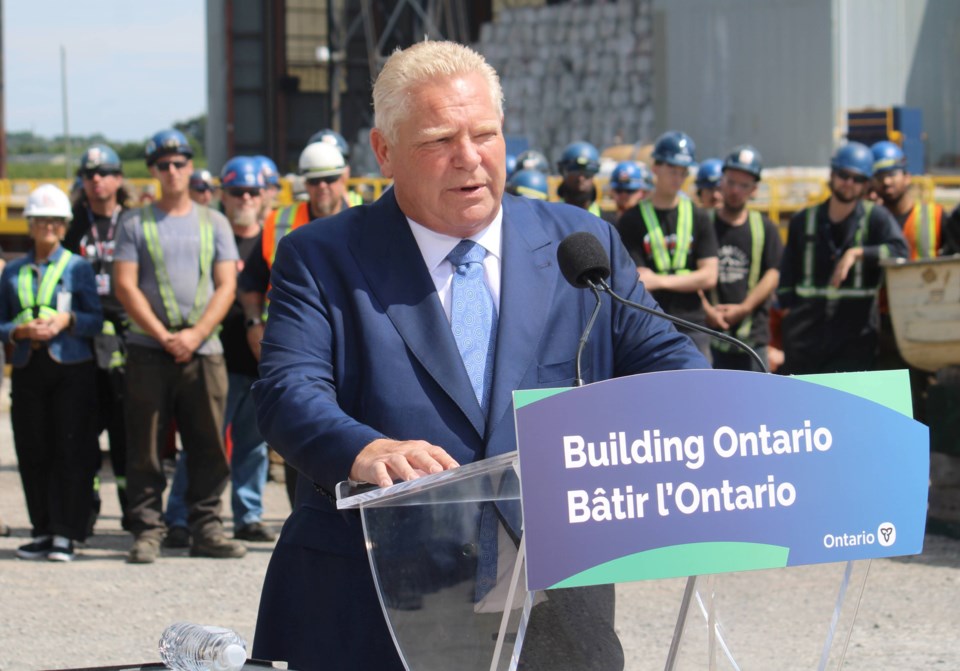The announcements came fast and furious as millions of dollars were showered on Niagara in the few days before Premier Doug Ford called a snap election set for Feb. 27.
In the days before the writ was officially dropped on Jan. 28, the Province announced funding for the next two years to support economic growth in rural communities; to establish a new seniors active living centre in Welland, three new elementary schools (in Welland and Thorold, totalling $96 million), and a GO station in Grimsby (part of a $75 billion investment in transit); to end encampments in municipal parks in Niagara ($3.1 million); to increase the farm risk management program by $100 million to $250 million; and to create a new homelessness and addiction recovery treatment hub in the region ($18.9 million over three years).
“It speaks to a testament on behalf of the premier and our team that funds have come into Niagara over the last few years,” Niagara West MPP Sam Oosterhoff said. “I think these kinds of investments demonstrate that we're willing to bring forward funding that will actually support jobs, that will support economic growth, and that supports our economy.”
And growth in the economy will help the government pay for the fundamentals such as healthcare and education, he said.
“You need tax dollars to be able to keep people working, to be able to keep the economy moving forward, and we need to be able to support our economy as a province,” Oosterhoff said.
But NDP MPPs Wayne Gates (Niagara Falls) and Jeff Burch (Niagara Centre) aren’t buying it.
"The legislature has sat for only seven weeks in the past seven months," and that’s where the premier and MPPs should be now, not on the campaign trail, said Gates.
“The fact that Doug Ford and his MPPs are agreeing to spend $200 million of taxpayers’ dollars on an unnecessary election for his own benefit is certainly something that I don't support. It's unnecessary, it's unwanted, and it's extremely costly.”
As for the millions being doled out in recent days, particularly the $1.8 billion investment in healthcare announced Jan. 27, meant to connect every person in Ontario to primary healthcare, Gates said it’s too little, too late.
“Let's take a look at where we're at here. You know, he's been in power seven years,” Gates said. “This is not a new government. Under his watch today, as we speak, 2.5 million Ontarians don't have a family doctor.”
Ford’s talk of needing a mandate to deal with Trump is an excuse to hold an early election that has actually been on the books for months, said Gates.
“I think everybody in Ontario knows that he already has a mandate, so, when you already have a mandate, you don't need another mandate."
When you already have a mandate, you don't need another mandate
Burch said all the funding announcements are tantamount to “vote buying.” They’re tactics being used by the government to win “an unnecessary election” when the PCs already had the tools to take on Trump.
“He has a mandate,” Burch said. “And all of these things that he's announcing? He's had seven years to do them.”
Instead of calling an election, Ford should have recalled the legislature, which was on an extended break, and dealt with issues the province is facing, such as healthcare, he said.
“They should have done a better job on healthcare over the last seven years,” Burch said. “It's gotten worse and worse. It's never been as bad as it is now.”
Instead, taxpayers are headed to the polls.
They're making funding promises "because they failed so badly,” Burch said. “Look at the doctor shortage, 2.5 million people without a doctor, 81,000 homeless people, and they're going into an election trying to make it about tariffs.”
While Burch and Gates were critical of the decision to send Ontarians to the polls, Oosterhoff said the election is needed so Ontario can be well-placed to take on U.S. President Donald Trump, who has threatened bring in a 25 per cent tariff on goods imported from Canada.
“Our message going forward is President Trump has four years, and in those four years, he's been clear he's going to use every tool at his disposal to challenge Ontario and Canadian workers, and we need to be able to outlast him when it comes to supports for families,” Oosterhoff said.
Stefan Dolgert, Associate Professor of Political Science at Brock University, said the flurry of funding announcements right before an election is not all that unusual.
“I think this is the kind of thing that is fairly typical, that any political party is going to try to target their expenditures,” Dolgert said. “Especially expenditures that are the kinds of things that the public wants expenditures on. They're going to try to target those in a window where the public is going to notice and appreciate it. Before a snap election is certainly one of those times.”
Just as predictable is the outcry from opposition parties, Dolgert said.
"It’s fair for the opposition parties to say, ‘Well, why didn't you do this before? You know, you’ve been in power a long time.’ I think that's a fair criticism.”
It would be no different with any other party in power, Dolgert said.
“If the Liberals were doing this before a snap election, or the NDP, the Conservatives would be saying, 'This is vote-buying. This is terrible,'” Dolgert said. “It's kind of all in the game that I think we would expect parties in power to do this, and that it's not technically breaking any laws or anything.”
